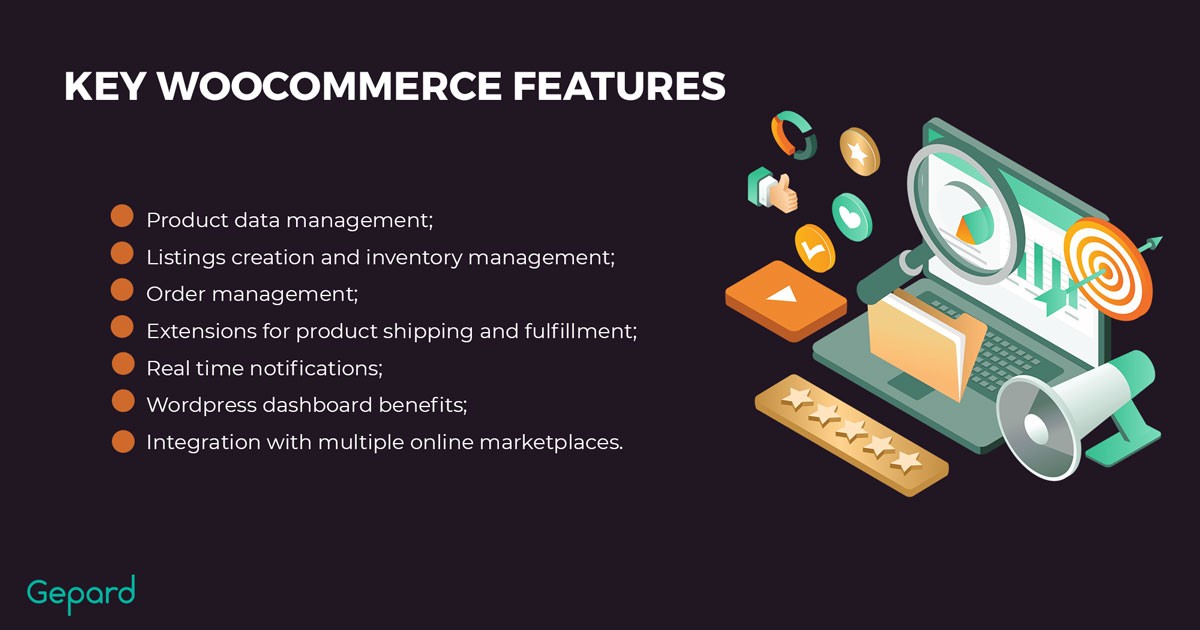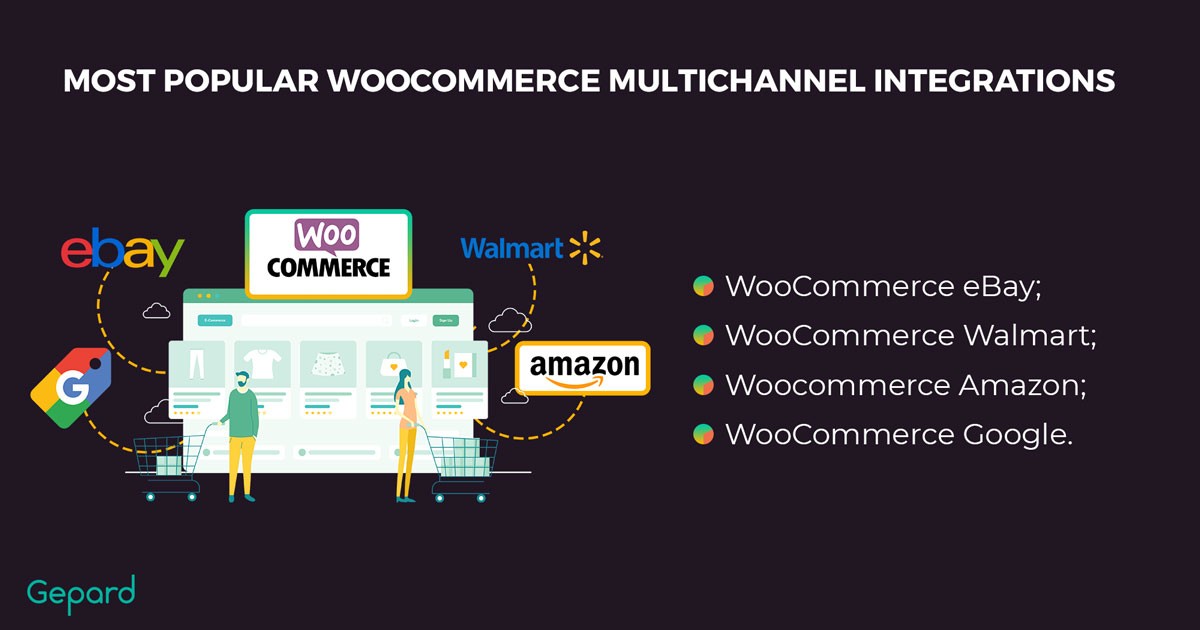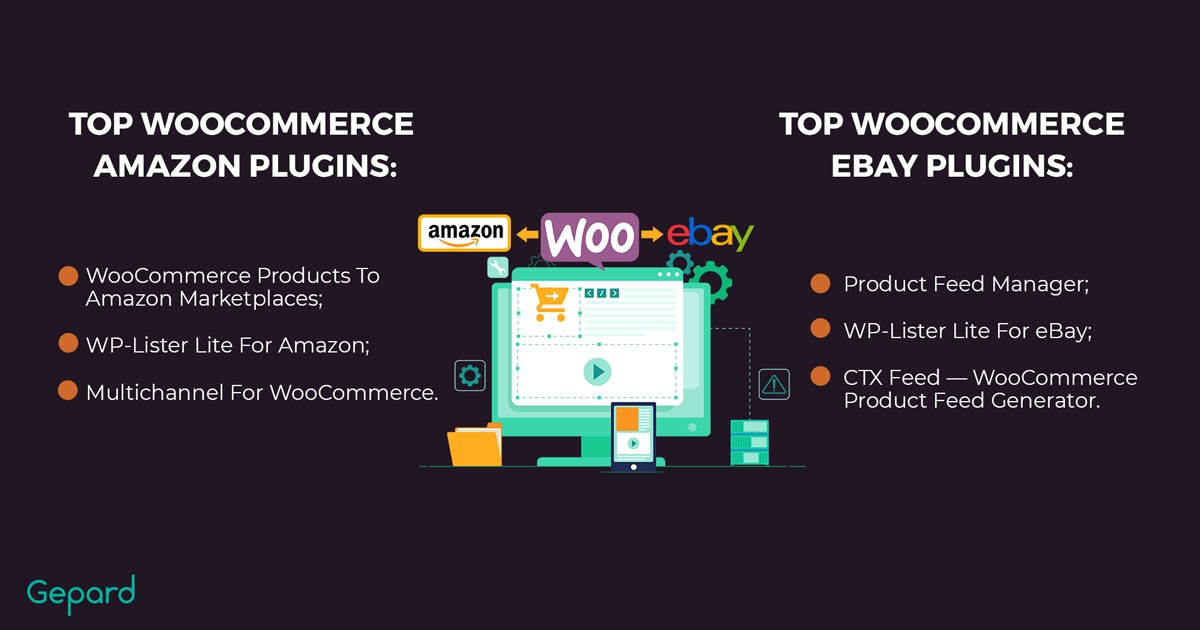WooCommerce Connector: Multichannel Integrations & Top Plugins For Your Business
WooCommerce connector is a popular solution for managing your business across many marketplaces. For many eCommerce retailers, several platforms may mean more problems. From creating listings to managing inventory, knowing the best way to get it together is a big hurdle. But it does not have to be. We will show you how to scale the process using the right multichannel tool.
What Is a WooCommerce Multichannel Connector?
And Multichannel WooCommerce?
The connector allows vendors to connect online stores from the WooCommerce platform. It supports stores such as eBay, Walmart, Amazon, and Google. You can manage orders, inventory, product information, and shipping details across many channels. With WooCommerce ERP integration, you can even expand your features and gain more control over your online business. Let’s take a look at some of the most popular connectors.

Most Popular WooCommerce Multichannel Integrations
Integrating with other platforms provides a seamless way to manage many marketplaces. Each solution offers specific support. For example, some offer eBay, Amazon, or even Shopify WooCommerce integration. Using these solutions, vendors can create listings and manage orders from one place. You can set rules for specific product details on each platform.
Most integrations also offer real-time stock and pricing sync features. The functionality ensures that any information update will reflect across your online stores. With this, vendors can exchange data with eCommerce partners and provide up-to-date information.
The most popular connector is the Multichannel. It provides integration for Amazon, eBay, Walmart, and Google. If you are looking to connect a Shopify store, you would need a WooCommerce Shopify connector.
1. WooCommerce eBay
The integration connects your eBay channel and its catalog to the WooCommerce platform. It offers unique features such as:
- An auto-categorization feature that publishes new products in the most suitable category;
- A WooCommerce eBay sync that synchronizes pricing, product, and inventory data in real-time;
- Flexible listings where sellers can set rules for specific product catalog details;
- Support for currency conversion and up to 23 international eBay stores;
- Domestic and international shipping services for global eCommerce.
2. WooCommerce Walmart
This connector allows integration with Walmart. You can access features like:
- Valid product identifiers for each item on the Walmart store channel. It includes the universal product code (UPC) and the global trade item number (GTIN);
- Real-time synchronization for product and inventory information between WooCommerce and your Walmart store;
- Customization options for specific details in each listing to create the best offers. The details could be price, quantity, or shipping services.
3. Woocommerce Amazon
With this connector, sellers can connect their Amazon store channel so they can:
- List new products, sync an existing one, or create offers. Creating listings requires an ASIN (American standard identification number);
- Access Amazon’s global network and sell on the site anywhere in the world. It also gives sellers access to the platform’s FBM and FBA fulfillment services;
- Optimize Marketplace search by setting a separate price and stock rule for the store.
4. WooCommerce Google
This integration allows you to connect your Google store for easy channel management. Some of the unique features for this integration include:
- Product listing ads (PLAs) that enable vendors to place ads in priority places. Some of those places are YouTube, at the top of Google SERP, and the Google display network;
- Google merchant center integration for real-time information synchronization;
- Access to auto-list products on Google Images, Shopping, etc.

Top WooCommerce Amazon Plugins For Your Business
WooCommerce Products To Amazon Marketplaces
This plugin allows you to sell on Amazon by creating a feed of your WooCommerce products. You also can upload products from the platform to Amazon. The best part about this plugin is its ease of use. You don’t need any coding skills. You can synchronize inventory data, customize the feed, and schedule information updates yourself.
The downside is that it does not support advanced features for shipping details.
WP-Lister Lite For Amazon
Besides enabling you to integrate your Amazon store, this connector has an SKU generator tool and an automatic repricing functionality. Vendors can view competitors’ prices as well. The plugin also provides support for the Amazon official feed templates and FBA. While this plugin may need a bit of a learning time, the features are well worth it.
Multichannel For WooCommerce
If you are looking for more extensive features, this is your tool. It is the official extension for Google, Amazon, eBay, and Walmart store channels. Once you connect WooCommerce to Amazon, you can manage almost every aspect of your store. It includes listings, inventory, shipping, and returns. The real-time sync ensures you can manage information across your connected channels.
The downside to this extension, if we can consider it as one, is that it is relatively new. This means that the long-term viability is unknown.
Top WooCommerce eBay Plugins For Your Business
Product Feed Manager
This plugin supports several stores, including eBay. You can schedule auto-updates, manage your listings and generate an accurate product feed. It also enables vendors to fill custom fields that are not available on WooCommerce. With this data, you can optimize your listings for more reach.
Still, the WooCommerce eBay integration is not advanced like the other supported channels. If you only need the basics, then this plugin can work well for your needs.
WP-Lister Lite For eBay
WordPress Woocommerce eBay connector plugin is an easy-to-use extension. It allows you to create and configure bulk listings from this platform. It has domestic and international shipping options, downloadable listing templates, and category mapping. WP-Lister also supports nine languages and product variations options for your catalog.
The only downside is that it has a steep learning curve. However, the customer support is excellent, so they likely will resolve your complaints as fast as possible.
CTX Feed—WooCommerce Product Feed Generator
This plugin offers an unlimited number of feeds and product listings. You can manage your listings, create platform-specific feeds, and map categories. The unique feature in CTX Feed is its compatibility with three SEO plugins: Yoast, All in one, and Rank Math. Other notable features are the dynamic attributes mapping, advanced filter, and multi-currency support.
Not found the perfect solution and still need a theme for your eCommerce website? Check out the WordPress marketplace theme by Wbcom Designs.

How Gepard PIM Can Help Automate Data Exchange Between WooCommerce And Any Retailer
Manually adjusting product data across several store channels can be daunting. The reason is that each platform differs. Some need unique details such as product identifiers. Others have specific ways of creating listings. As such, meeting each marketplace’s requirements using this method is difficult.
Also, it can be time-consuming. Imagine the number of minutes or hours it would take to fill information in one platform. Repeating the exact process in various other channels is not sustainable. Gepard PIM, an advanced syndication solution, aims to solve these challenges and enables flawless product data delivery to multiple marketplaces while adjusting to all the retailers’ requirements and product taxonomy.
What Is Next: Scaling Your Business Through Product Syndication
Gepard PIM has advanced product syndication features that automate data entry. Vendors can create, update and distribute information across store channels. The PIM solves retailers product syndication challenges by:
- Integrating with product databases;
- Automating regular updates for price and inventory data;
- Mapping data to the specific requirements of each platform.
These solutions help companies reduce data entry errors and share information across marketplaces. With this, they can speed up time-to-market to gain a competitive edge. We have found that by using Gepard PIM, vendors can improve operational efficiency by 75%.
Do you want to optimize your product syndication? Or scale your business across many store channels? Book a personalized demo now.





